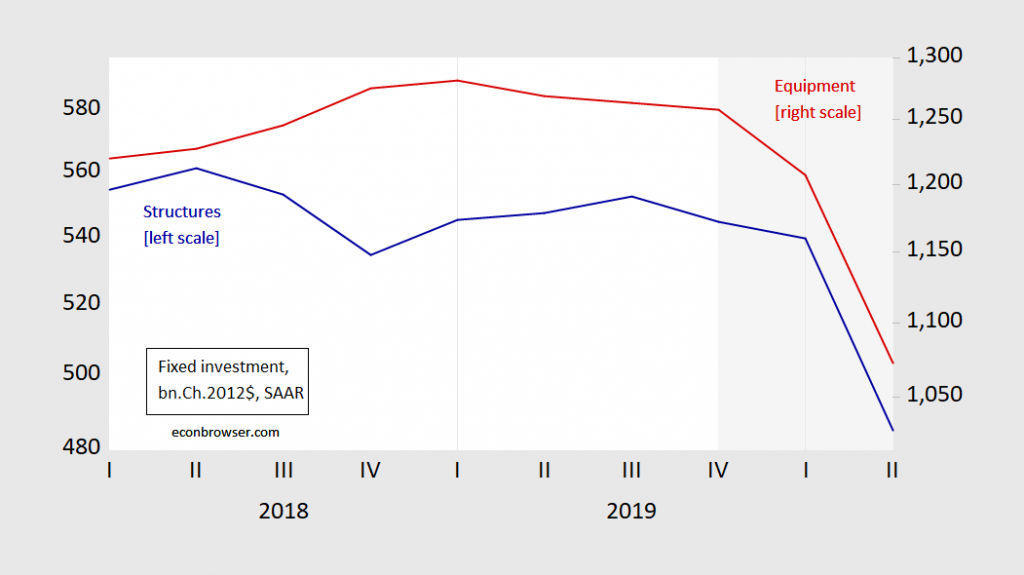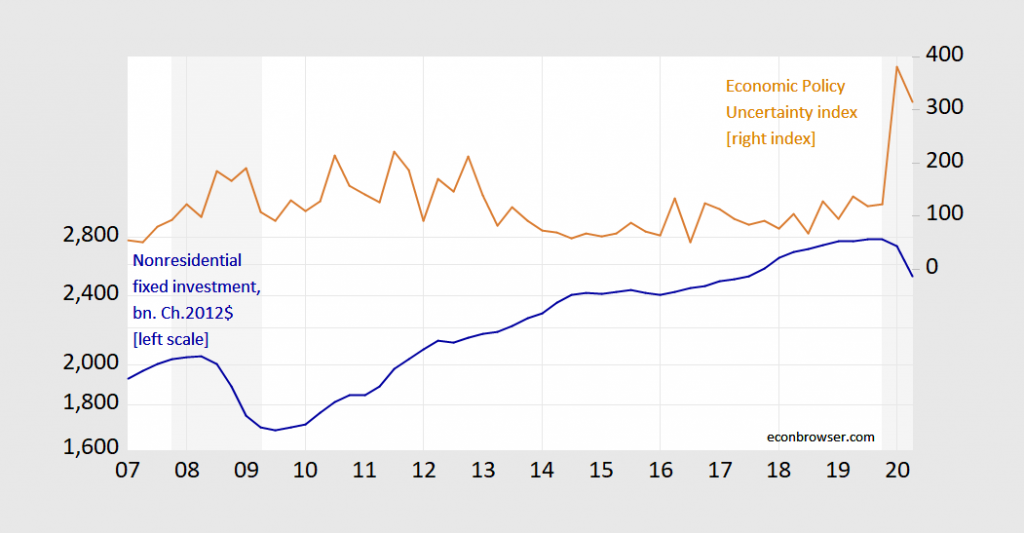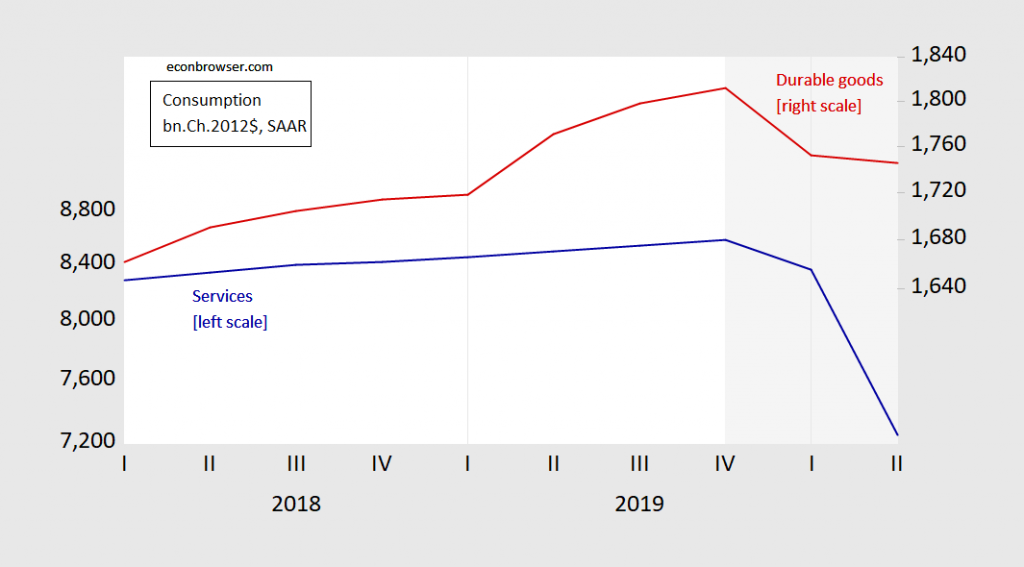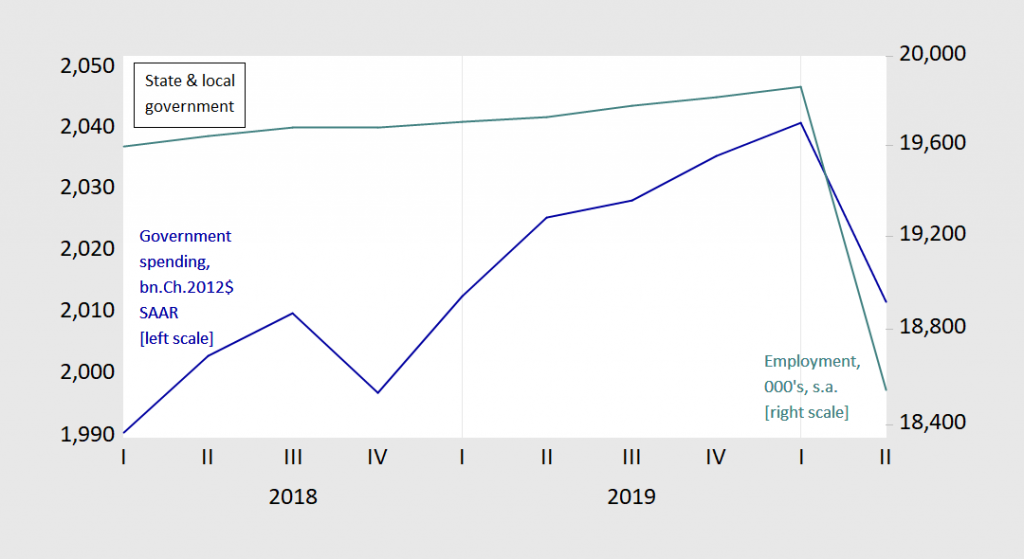Economy
The GDP Collapse: It Is What It Is
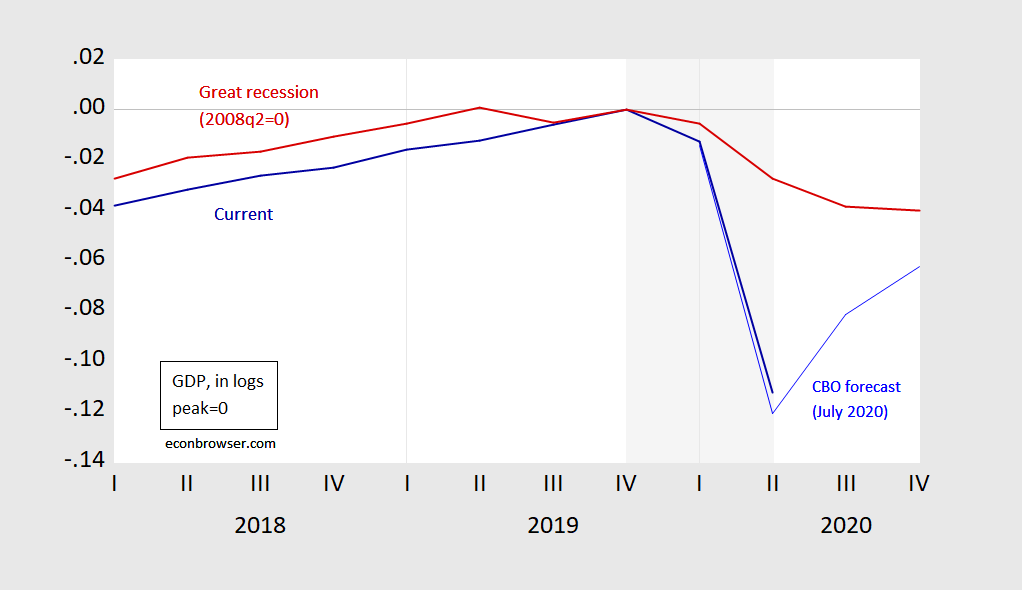
Jim discussed elements of the 2020Q2 advance release on Thursday. Here, I amplify some aspects that he mentioned.
Confirmation: A Catastrophe in the Making
First, the Trump recession is truly catastrophic in scale; the pace of GDP decline is much greater than that in 2008. This is shown in Figure 1.
Figure 1: GDP in logs, normalized to 0 at 2019Q4 (NBER peak) (blue), and GDP normalized to 2008Q2 (red). NBER defined recession shaded gray, assuming trough at 2020Q2. Source: BEA, 2020Q2 advance release, CBO An Update to the Economic Outlook (July), NBER, author’s calculations.
A “No Confidence” Vote in Administration Policy and Investment
Second, investment has crashed — for both structures and equipment investment. That’significant insofar as capital investment is forward looking.
Figure 2: Fixed investment in structures (blue, left log scale), and in equipment (red, right log scale), in billions Chained 2012$, SAAR. NBER defined recession shaded gray, assuming trough at 2020Q2. Source: BEA, 2020Q2 advance release, NBER, author’s calculations.
This decline is even more rapid than in 2008Q4; 31.5% now vs. 24% then.
Figure 3: Nonresidential fixed investment in logs, normalized to 0 in 2019Q4 (blue), and normalized to 0 in 2008Q2 (red). NBER defined recession shaded gray, assuming trough at 2020Q2. Source: BEA, 2020Q2 advance release, NBER, author’s calculations.
Certainly, some of the crash is due to the crash in aggregate demand — as in the 2007 recession — but some is due to uncertainty, including policy uncertainty. Policy uncertainty levels currently dwarf those of the Great Recession.
Figure 4: Nonresidential fixed investment in billions Chained 2012$ SAAR (blue, left log scale), Economic Policy Uncertainty index (tan, right scale). NBER defined recession shaded gray, assuming trough at 2020Q2. Source: BEA, 2020Q2 advance release, NBER, policyuncertainty.com via FRED, and author’s calculations.
No Recovery Without Recovery in Services Demand
Third, this is a different kind of recession, in many ways, but importantly in the sectoral origin. As Jim Hamilton noted, the decline in services consumption was 43.5% on an annualized basis, while durable goods consumption was relatively flat.
Figure 5: Services consumption (blue, left log scale), and durable goods consumption (red, right log scale), all in billions Chained 2012$ SAAR. NBER defined recession shaded gray, assuming trough at 2020Q2. Source: BEA, 2020Q2 advance release, NBER, and author’s calculations.
Of the 9.8 percentage point decline in GDP (not annualized), 5.9 percentage points were accounted for (in a mechanical sense) by services consumption decline. Jim provides a breakdown of the services consumption decline in his post.
Services consumption will not fully recover until such time as the Covid-19 infection rates are at manageable levels that do not deter such consumption activities. The Administration’s current policy stance is unlikely to encourage that development; one could argue that it — in toto — is impeding that outcome.
State and Local Government Spending Collapses
Fourth, the biggest threat to the economy may be avoidable. One of the lessons of the Great Recession is that constraints on state and local government spending — exacerbated by ill-advised state income tax cuts — was one of the reasons for the torpid pace of recovery. So far, we have not replicated completely that experience, but with Republican opposition to further Federal transfers to the state, we are in danger of repeating that error.
Figure 6: State and local government spending, billions Chained 2012$ SAAR (blue, left log scale), and state and local employment, 000’s, s.a. (teal, right log scale). Source: BEA 2020Q2 advance release, BLS employment situation June release.
This is why it is critical, as many economists have argued, for the next recovery package to include substantial aid to the states and localities.
Economy
6 Crucial Races That Will Flip the SenateThis November, we have…
6 Crucial Races That Will Flip the Senate
This November, we have an opportunity to harness your energy and momentum into political power and not just defeat Trump, but also flip the Senate. Here are six key races you should be paying attention to.
1. The first is North Carolina Republican senator Thom Tillis, notable for his “olympic gold” flip-flops. He voted to repeal the Affordable Care Act, then offered a loophole-filled replacement that excluded many with preexisting conditions. In 2014 Tillis took the position that climate change was “not a fact” and later urged Trump to withdraw from the Paris Climate Accord, before begrudgingly acknowledging the realities of climate change in 2018. And in 2019, although briefly opposing Trump’s emergency border wall declaration, he almost immediately caved to pressure.
But Tillis’ real legacy is the restrictive 2013 voter suppression law he helped pass as Speaker of the North Carolina House. The federal judge who struck down the egregious law said its provisions “targeted African Americans with almost surgical precision.”
Enter Democrat Cal Cunningham, who unlike his opponent, is taking no money from corporate PACs. Cunningham is a veteran who supports overturning the Supreme Court’s disastrous Citizens United decision, restoring the Voting Rights Act, and advancing other policies that would expand access to the ballot box.
2. Maine Senator Susan Collins, a self-proclaimed moderate whose unpopularity has made her especially vulnerable, once said that Trump was unworthy of the presidency. Unfortunately, she spent the last four years enabling his worst behavior. Collins voted to confirm Trump’s judges, including Brett Kavanaugh, and voted to acquit Trump in the impeachment trial, saying he had “learned his lesson” through the process alone. Rubbish.
Collins’ opponent is Sara Gideon, speaker of the House in Maine. As Speaker, Gideon pushed Maine to adopt ambitious climate legislation, anti-poverty initiatives, and ranked choice voting. And unlike Collins, Gideon supports comprehensive democracy reforms to ensure politicians are accountable to the people, not billionaire donors.
Another Collins term would be six more years of cowardly appeasement, no matter the cost to our democracy.
3. Down in South Carolina, Republican Senator Lindsey Graham is also vulnerable. Graham once said he’d “rather lose without Donald Trump than try to win with him.” But after refusing to vote for him in 2016, Graham spent the last four years becoming one of Trump’s most reliable enablers. Graham also introduced legislation to end birthright citizenship, lobbied for heavy restrictions on reproductive rights, and vigorously defended Brett Kavanaugh. Earlier this year, he said that pandemic relief benefits would only be renewed over his dead body.
His opponent, Democrat Jaime Harrison, has brought the race into a dead heat with his bold vision for a “New South.” Harrison’s platform centers on expanding access to healthcare, enacting paid family and sick leave, and investing in climate resistant infrastructure.
Graham once said that if the Republicans nominated Trump the party would “get destroyed,” and “deserve it.” We should heed his words, and help Jaime Harrison replace him in the Senate.
4. Let’s turn to Montana’s Senate race. The incumbent, Republican Steve Daines, has defended Trump’s racist tweets, thanked him for tear-gassing peaceful protestors, and parroted his push to reopen the country during the pandemic as early as May.
Daine’s challenger is former Democratic Governor Steve Bullock. Bullock is proof that Democratic policies can actually gain support in supposedly red states because they benefit people, not the wealthy and corporations. During his two terms, he oversaw the expansion of Medicaid, prevented the passage of union-busting laws, and vetoed two extreme bills that restricted access to abortions.The choice here, once again, is a no-brainer.
5. In Iowa, like Montana, is a state full of surprises. After the state voted for Obama twice, Republican Joni Ernst won her Senate seat in 2014. Her win was a boon for her corporate backers, but has been a disaster for everyone else.
Ernst, a staunch Trump ally, holds a slew of fringe opinions. She pushed anti-abortion laws that would have outlawed most contraception, shared her belief that states can nullify federal laws, and has hinted that she wants to privatize or fundamentally alter social security “behind closed doors.”
Her opponent, Democrat Theresa Greenfield, is a firm supporter of a strong social safety net because she knows its importance firsthand. Union and Social Security survivor benefits helped her rebuild her life after the tragic death of her spouse. With the crippling impact of coronavirus at the forefront of Americans’ minds, Greenfield would be a much needed advocate in the Senate.
6. In Arizona, incumbent Senate Republican Martha McSally is facing Democrat Mark Kelly. Two months after being defeated by Democrat Kyrsten SINema for Arizona’s other Senate seat, McSally was appointed to fill John McCain’s seat following his death. Since then, she’s used that seat to praise Trump and confirm industry lobbyists to agencies like the EPA, and keep cities from receiving additional funds to fight COVID-19. As she voted to block coronavirus relief funds, McSally even had the audacity to ask supporters to “fast a meal” to help support her campaign.
Mark Kelly, a former astronaut and husband of Congresswoman Gabby Giffords, became a gun-control activist following the attempt on her life in 2011. His support of universal background checks and crucial policies on the climate crisis, reproductive health, and wealth inequality make him the clear choice.
These are just a few of the important Senate races happening this year.
In addition, the entire House of Representatives will be on the ballot, along with 86 state legislative chambers and thousands of local seats.
Winning the White House is absolutely crucial, but it’s just one piece of the fight to save our democracy and push a people’s agenda. Securing victories in state legislatures is essential to stopping the GOP’s plans to entrench minority rule through gerrymandered congressional districts and restrictive voting laws — and it’s often state-level policies that have the biggest impact on our everyday lives. Even small changes to the makeup of a body like the Texas Board of Education, which determines textbook content for much of the country, will make a huge difference.
Plus, every school board member, state representative, and congressperson you elect can be pushed to enact policies that benefit the people, not just corporate donors.
This is how you build a movement that lasts.
Economy
Fear & Data
Fear.
It is a key driver of behavior, whether in markets (Fear & Greed), politics (Tribalism), Health care (Anti-Vaxxers) or whatever (FOMO).
Fear is a great memory aid. For most of human history, people communicated not via the written word, but by oral storytelling. Hence, we are primed for emotional, memorable narratives. Looking at data and performing cold, calculated analyses is a learned, not innate, skill.
Social media understands this. Is it any surprise the algorithms of Facebook surfaces the most extreme views and claims? Look at what plays directly into that evolutionary trait, via clickbait and manufactured outrage. With our perfect hindsight bias, isn’t it obvious how inevitable this was?
Irrational fear is a driver of much of what we think and do. Often reflexively, frequently without thought. Contemplate what this means as you process new pandemic information, relying on mental models, performing data analysis.
How often do we react to a headline we disagree with, but after diving into the data underneath, it changes our mind? Not often enough, but on those rare occasions when that happens, it is a sign that you are doing this correctly. Our first reaction is the thoughtless programmed emotional response; the second is the more complex analytical result. It is your lizard brain (basal ganglia and brainstem) versus developed frontal lobe (neocortex).
Which brings us back to Covid-19. The probability of anyone of person getting this disease and then suffering a fatality is exceedingly low. I don’t want to suggest things are statistically normal, and you should definitely do things to stay safe: wear masks, socially distance, wash your hands frequently, and not touch your face. You can be (relatively) safe by doing these simple things.
But excess fear is driving all sorts of negative consequences, including stress, psychoses, economic damage, relationship issues, and health problems. This is counter-productive.
One day, this pandemic will end. Then we can all go back to worrying about cholesterol, high blood pressure and sugar.
Previously:
Over/Under Represented: Causes of Death in the Media (June 13, 2020)
Fearing the Dramatic, Complacent for the Mundane (April 29, 2020)
Denominator Blindness, Shark Attack edition (February 5, 2020)
Shark Attacks Illustrate an Investing Problem (February 4, 2020)
MiB: Danny Kahneman (February 11, 2020)
Crashes & Terrorists & Sharks – Oh, My! (November 9, 2020)
How’s Your MetaCognition? (August 16, 2020)
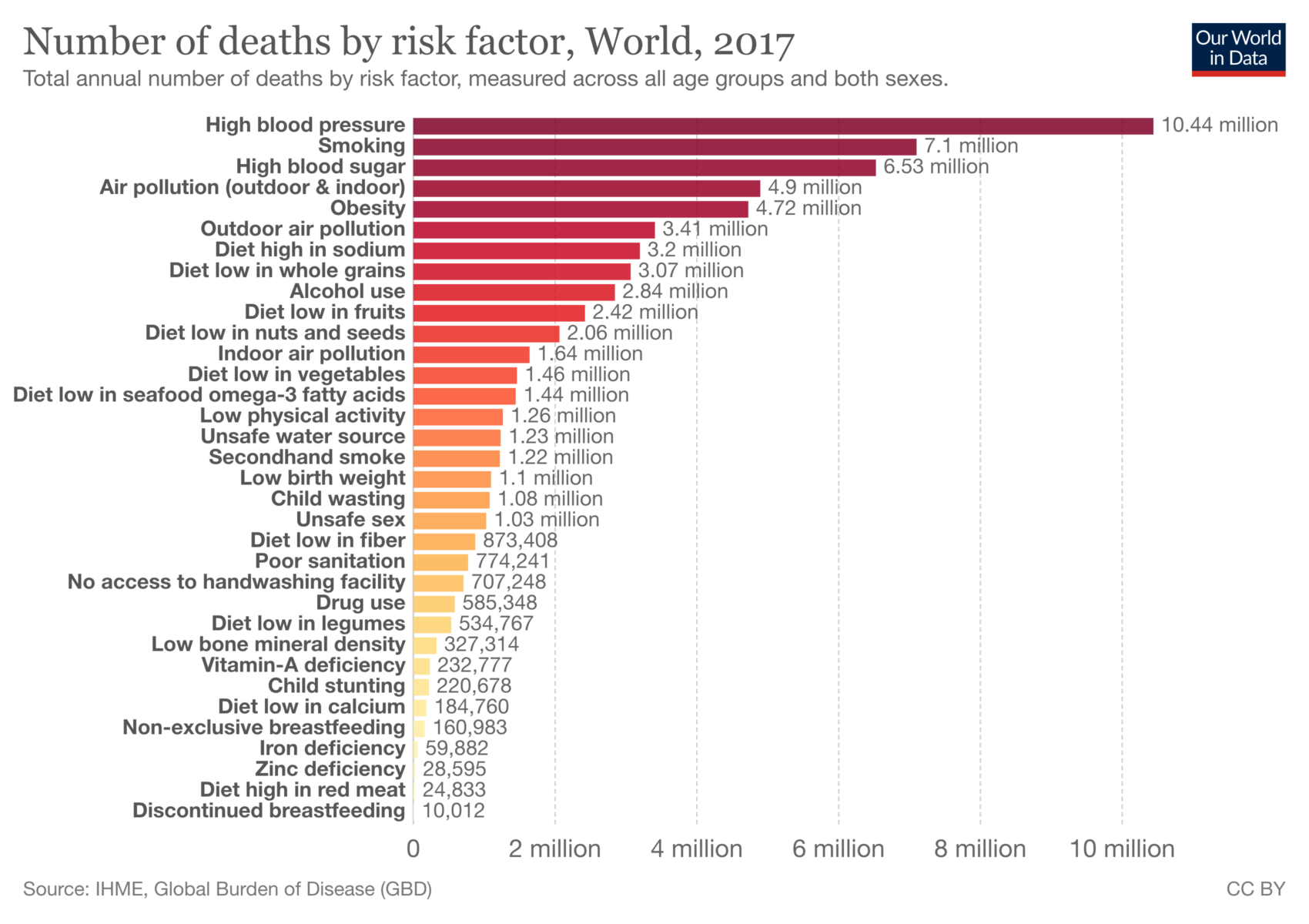
Source: Our World In Data
The post Fear & Data appeared first on The Big Picture.
Economy
COVID-19 Tearing Families Apart
COMMENT: Mart, this is tearing my family apart. I can no longer even speak to my son. He is against Trump simply because he does not like him personally or his tweets. I try to explain this should not turn on those issues. This is a war for your future. My son will not listen and he will vote against himself and is too brainwashed to see the bigger picture.
GA
ANSWER: I know of many people in the same boat. Even two of my business partners had ended all communication with their children. My partner, who died about 20 years ago, insisted I make sure everything went to his second wife and nothing to his children in the event of his death. These things are sad, but the brainwashing that has been taking place is thicker than even blood. It is very sad. But this is precisely what was carried out in East Germany. They deliberately tried to turn the children against their parents. That was a strategic tool of the left. This entire COVID-19 scheme is dividing the country. One father wrote in and said his son said all he cared about was taxes. They have no idea what their vote will mean in this election.
 This is an agenda that is well organized, and it is a major effort as was the Communist Revolution of 1848 and then 1917/1918. People know about the Weimar Republic and the hyperinflation of the 20s, but it was a revolution in Germany in 1918 that overthrew the government, even boldly asked Russia to come to absorb Germany so they could enjoy the Communist Utopia, that led to the chaos. People hoarded all wealth and converted to foreign currencies.
This is an agenda that is well organized, and it is a major effort as was the Communist Revolution of 1848 and then 1917/1918. People know about the Weimar Republic and the hyperinflation of the 20s, but it was a revolution in Germany in 1918 that overthrew the government, even boldly asked Russia to come to absorb Germany so they could enjoy the Communist Utopia, that led to the chaos. People hoarded all wealth and converted to foreign currencies.
The idealistic fools who were brainwashed were left penniless. This is the fate of your son, sad to say. Those with any wealth, the older people, understood what was at stake. They prepared. The youth, believing in Utopia, suffered from hyperinflation. When the new currency was finally created in 1925, it was backed by real estate — not gold which had vanished thanks to hoarding.
Unfortunately, the youth are blind. Biden is a puppet. He will surrender the sovereignty to the United Nations and this is why they are fighting so hard. Michael Bloomberg is very evil. He is trying to pay all the fines, $20 million, of felons in Florida with the implication they will vote for Biden. I really do not want to live in a world where Bloomberg has any power whatsoever. The nice things will be to see Gates, Zuckerberg, and Bloomberg, among a long list of others supporting this new tyranny, will then become the targets are stripped of their wealth as the final phase takes place — nationalization of companies.
There is nothing you can do. They have been brainwashed. It is hard to bear. But we simply must understand that they are creating this new world and they will ONLY learn from experience. We cannot shelter them. To walk, they have to fall many times. This can be irreversible. Unless they see the error of their ways soon, then the split becomes permanent. The more you try to show them, the more they will not listen. That’s why it is so important to pay attention to what they are being told in school.
-
 Business2 months ago
Business2 months agoBernice King, Ava DuVernay reflect on the legacy of John Lewis
-
World News2 months ago
Heavy rain threatens flood-weary Japan, Korean Peninsula
-
 Technology2 months ago
Technology2 months agoEverything New On Netflix This Weekend: July 25, 2020
-
Finance4 months ago
Will Equal Weighted Index Funds Outperform Their Benchmark Indexes?
-
Marketing Strategies9 months ago
Top 20 Workers’ Compensation Law Blogs & Websites To Follow in 2020
-
 World News8 months ago
World News8 months agoThe West Blames the Wuhan Coronavirus on China’s Love of Eating Wild Animals. The Truth Is More Complex
-
Economy11 months ago
Newsletter: Jobs, Consumers and Wages
-
 Finance10 months ago
Finance10 months ago$95 Grocery Budget + Weekly Menu Plan for 8

